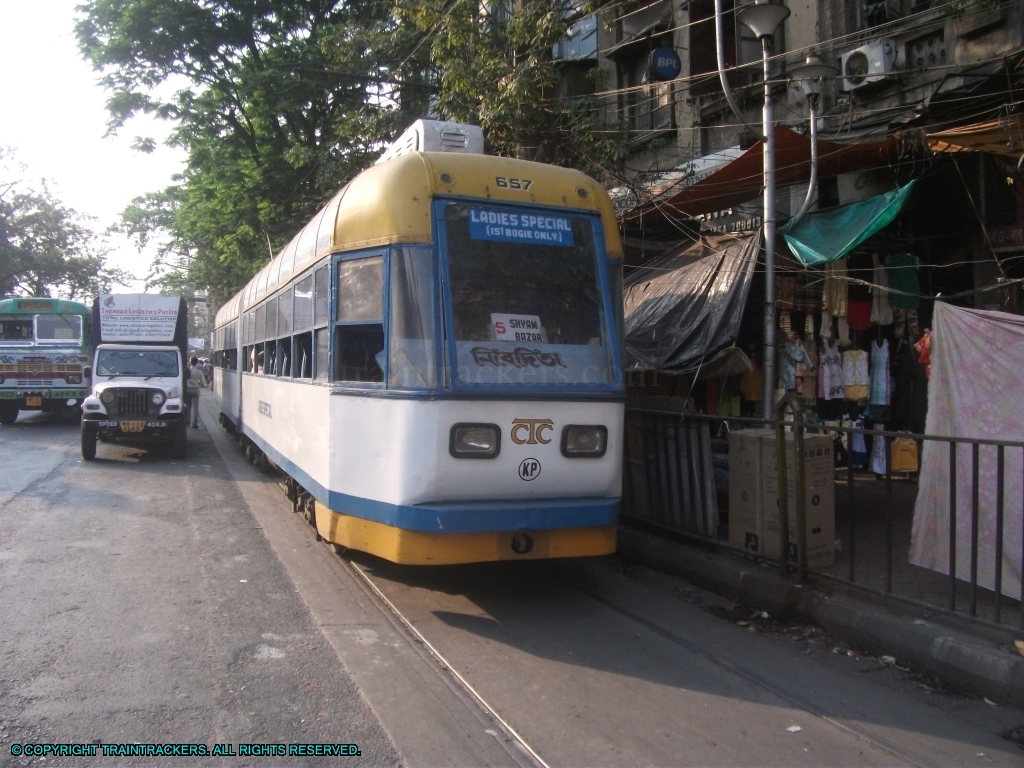
Nivedita --- On 15th March 2012, CTC introduced two Ladies special trams in the city - # 657 & # 279. A rebuilt Burn Standard tramcar (# 657 in the photo above) was re-introduced into normal passenger service with modernised look & fibre-body chirstened after Sister Nivedita - the great educationist & pioneer in women education in India. The special thing about this tramcar is the first compartment is reserved for Ladies whereas second coach is common for all passengers. Spotted at Lenin Sarani (Dharmatala Street) while it was going towards Shyambazar from Esplanade junction serving Route # 5. Framed by Roy on 8th March 2013.
Born as Margaret Elizabeth Noble on 28th October 1867 in Dungannon, Ireland. This great Irish-born schoolteacher who was a follower and a disciple of Swami Vivekananda became an influential spokesperson promoting Indian national consciousness, unity, and freedom. Noble met Vivekananda when he visited England in 1895, and she was attracted to the universal principles of Vedanta and to Vivekananda’s humanistic teachings. she worked for the Vedanta movement in England until she went to India in 1898. Her great level of devotion compelled Vivekananda to give her the name 'Nivedita' (Dedicated One). She went to India primarily to help Vivekananda realize his plans to educate women and she opened a small school at North Calcutta where she tried to blend Indian traditions with Western ideas. She also added courses to train young women in arts and crafts in addition to basic academic subjects.
Nivedita also made notable efforts to serve the poor of Calcutta and Bengal during times of plague, famine, and floods there. Following Vivekananda's death in 1902, Nivedita turned her attention more toward India’s political emancipation. She objected strongly to the partition of Bengal in 1905 and, as part of her deep involvement in the revival of Indian art, supported the 'Swadeshi Movement' that called for the boycott of imported British goods in favour of domestically produced handmade goods. She continued to give lectures in India and overseas, promoting Indian arts and the education of Indian women. During her close contact with the Indian people, they came to love their 'Sister' with devoted admiration bordering on veneration. Sister Nivedita, was the centre of veneration of both Swami Vivekananda and Rabindranath Tagore. She was instrumental in inspiring all of India's scientists (e.g, Sir Jagadish Chandra Bose, Basiswar Sen), artists (like Abanindra Nath Tagore, Nandalal Bose), educationist (like Brajendra Nath Sil, Ramananda Chattopadhyay, Kumud Bandhu Sen), and above all freedom fighters (like Mahatma Gandhi, Rasbihari Ghosh, Gopal Krishna Gokhale, Arabinda Ghosh, Barin Chandra Ghosh, Bipin Chandra Pal). She also came into contact with young revolutionaries like Taraknath Das.
Nivedita's tireless activity, austere lifestyle, and disregard for her own welfare eventually caused her health to fail, and she died at the age of 44 in the year 1911 at Darjeeling.


